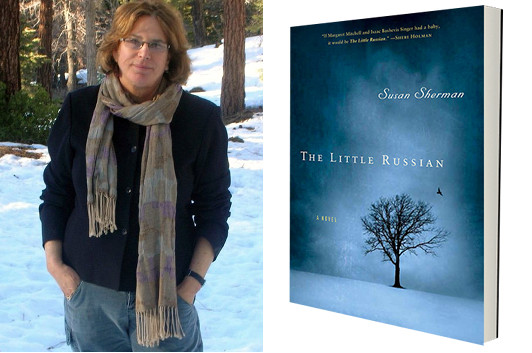Susan Sherman: Peddling for Gold

The early 20th-century Ukraine, still known in those days as “Little Russia,” is a world away from the Disney Channel’s That’s So Raven, so I was curious about what brought that show’s co-creator, Susan Sherman, to the story of Berta, a young Jewish woman who gets a taste of Moscow high life and then is sent back home to her family in Mosny. It turns out The Little Russian is rooted in Sherman’s family history—and though she knew that history well as it had been passed down among her kin, she soon realized that’s not the same thing as a story you can tell in a novel. Fortunately, she explains, there was one aspect of the novel’s emotional core she didn’t have to research, because she’d gone through similar experiences in her own life…
I remember the morning I lay in bed thinking about writing a Russian novel. It was a cold, bright winter morning and I had just finished my last season on That’s So Raven. I couldn’t imagine doing another season in television; after a decade, I was burned out. Sitcoms are a tough life for a writer: the hours are grueling and the work isn’t very satisfying. I wanted to write something I cared about, to be challenged. It was time to write my grandmother’s story.
For as long as I can remember the Grandma Bessie story was the legend of our family. No other story in our family could compare. It was filled with pathos, courage, and heart-stopping action. Grandma Bessie, née Berta Alshonsky, was born in a little shtetl (that’s Yiddish for Jewish hamlet) on the Dneiper River in the Ukraine and was sent to live with rich relatives in Moscow when she was fourteen. At twenty-two, she was sent back to the shtetl, where she met and eventually married my grandfather, a successful wheat merchant. Together they built a comfortable life in Cherkast until he got drafted into the Czar’s army, contracted pleurisy, and, after recovering, fled to America to avoid serving out his time. Grandma Bessie’s fatal mistake was not going with him.
She planned to join him once he got settled, but this was January 1914. By August of that year World War I broke out and she found herself trapped in the Ukraine with her two children. Over time she lost everything and was reduced to peddling to keep her children from starving to death. Everyday she would go out to the countryside and peddle cheap beads, gold jewelry, pots and pans, anything that could turn a profit and keep food on the table. It was a hard life slogging through the muddy fields, dodging the warring factions, and selling or trading her wares to keep her children alive.
Although it was an exciting story, it lacked the kind of detail I would need if I were going to turn it into book. It’s the kind of detail you acquire just by living in the time, the intimate minutiae of everyday life that’s essential to create the world. It would take years of research to yield that kind of knowledge and I was more than willing to devote the time. I wanted to read about Russian winters, straight-in-front corsets, whale bone collars, droshkies, dugas, and tachankas, sledges outfitted with Lewis or Vickers machine guns. I knew I could learn what I needed to know, but I wanted more. It was one thing to learn about a subject and quite another to know it.
Fortunately, there was one element of the story that I did know about. I knew about peddling. I had been a peddler once after graduate school. I sold cheap gold jewelry to office workers in the San Fernando Valley to augment a part time teaching job at a local college. At the time I hated it, thinking it was demeaning, and just a little dangerous. Now, I’m grateful for it. I know what it feels like to cart your sample case from place to place, to worry about getting robbed, to haggle about prices, to chat up customers one day and hunt them down the next in order to get paid. I know the high of a big sale and the low of getting stiffed, of fatigue, despair, and humiliation. Once a nun kicked me out of a hospital lobby.
Now, I’m fully aware that selling a pair of earrings to the receptionist at Pex Plumbing Supply isn’t quite the same thing as selling bracelets to the bol’shak of a family, who is buying them for the bride of his eldest son. Lugging my sample case up a flight stairs isn’t like trudging through snowy fields or dodging the Green Army of the Ukrainian partisans or the Black Army of the anarchists or a regiment of Don Cossacks. Still, it was a tremendous help with those chapters. As an historical fiction writer, I’ll take experience where I can find it, whether it’s hanging out at a local stable to get the smell, sound, and feel of horses or spending two freezing weeks trudging around in the snow up in a nearby mountain range. Experience is hard to come by for a writer of historical fiction, but when you can get it it’s gold. The kind you don’t have to peddle.
20 February 2013 | guest authors |

 Our Endless and Proper Work is my new book with Belt Publishing about starting (and sticking to) a productive writing practice.
Our Endless and Proper Work is my new book with Belt Publishing about starting (and sticking to) a productive writing practice. 
